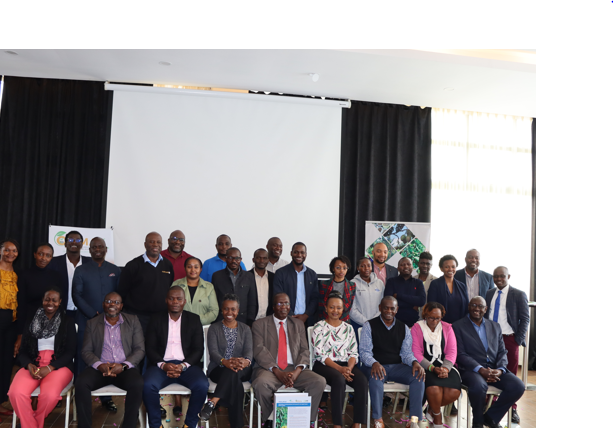The organic inputs sector comprising bio-fertilisers, organic pesticides and related products, is a key lever for economic growth and improving the sustainability and resilience of Kenya’s food systems.
The current global shift toward sustainable agriculture has accelerated the demand for organic inputs, driven by concerns over soil health, climate change, and food safety. In comparison to other African countries, the organic fertiliser sub-sector in Kenya is fairly advanced.
In developing and emerging economies, this transition presents a significant opportunity for entrepreneurs and small and medium enterprises (SMEs), yet businesses operating in this sector often face regulatory, financial, and infrastructural hurdles.
According to a policy brief by the Intersectoral Forum on Agrobiodiversity and Agroecology (ISFAA) and partners, there is a pressing need to create a more enabling business environment for the organic input sector in the country.
The policy brief titled ‘Cultivating an Enabling Business Environment for Organic Inputs Sector in Kenya’ states that the organic inputs sector faces significant challenges that hinder growth, innovation and adaptation of more sustainable farming practices.
According to the policy brief, while the organic inputs sector is a key lever for economic growth and improving the sustainability and resilience of Kenya’s food system, businesses operating in the sector currently face a number of challenges, including licensing and certification, high costs, regulatory and standard-related barriers, as well as lack of policy support, among other challenges.
The policy brief states that these issues create an unfavorable business environment in which it is difficult for organic input companies, in particular SMEs, to bring innovative products to the Kenyan market and gain access to international markets. As a consequence, organic input companies are unable to scale up impactful solutions to agri-food systems challenges, while the economic potential of the organic input sector at large is held back.
Agriculture Engineering Secretary in the Ministry of Agriculture and Livestock Development, Eng. Laban Kiplagat, says that Kenya’s Agriculture policy on organic inputs has evolved to emphasize sustainable farming practices aiming to enhance soil health, reduce dependency on synthetic fertilizers and promote food security.
In a speech read on his behalf by the Director Policy Unit, State Department for Agriculture, Peter Owoko, during the launch of the policy brief, Kiplagat said that the use of organic fertilizers and biopesticides enhances soil health, increases biodiversity and improves resilience of farming systems to climate change.
“The policy brief supports informed decision-making, advocates for policy change and promotes accountability,” he said adding that to engage in policy-making encompasses the need for research, education and policy support to achieve this goal.
Eng. Kiplagat called upon all stakeholders, who are decision-makers in the organic inputs sector, to take action as suggested in the policy brief, adding that the Ministry remains committed to supporting sustainable use of organic inputs with a focus on increasing productivity, food and nutritional security.
ISFAA Coordinator Dr Martin Oulu said that the policy brief has been developed to inform and influence decision-makers in cultivating an enabling business environment for the organic inputs sector and support agroecological transitions.
Oulu said that addressing the challenges highlighted in the brief will encourage organic inputs sector players in innovation and farmer adoption of organic inputs to strengthen Kenya’s position as a regional leader in organic agricultural inputs.
“Ensuring that our innovators and manufacturers are able to produce enough organic fertilizer and organic pesticides is important because this will ensure that we enhance our soils and are able to produce more healthy food,” he said.
Dr. Oulu said that producing more organic inputs will ensure that the food that we produce and consume is healthy. It will also reduce the cost of production for farmers meaning farmers will be able to earn more from their farming enterprises.
He said that enhancing the business environment of the sector is aligned to key national policies and strategies including the National Agroecology for Food System Transformation Strategy, 2024-2033.
Meanwhile, the policy brief synthesized findings from stakeholder consultations conducted by the Private sector, Markets and Consumers thematic working group of ISFAA with funding support from Biovision Foundation.
Organic inputs companies used in the survey were member organizations of the Integrated Biopesticides Manufacturers Association of Kenya (IBMA-Kenya) and the Organic Fertilizer and Input Manufacturers Association of Kenya (OFIMAK).
According to the brief, surveyed companies reported waiting periods exceeding five months, despite the KEBS service charter stipulating that the registration process should take no more than 56 days, hence significantly delaying product registration, business operations and sales
The high costs of the product registration process pose another significant challenge for the sector players. Certification of an organic fertilizer through KEBS can range from Sh30,000 to Sh40,000 per product. Thereafter the manufacturers must pay the same amount for product renewal applications every two years.
According to the brief, it costs Sh85,000 to register a single product for five years. Thereafter, biopesticide manufacturers pay Sh55,000 to obtain a three-year product renewal.
The cost of Environmental Impact Assessment (EIA) for input manufacturers as part of compliance requirements is also substantial. One company reported spending close to Sh50,000 on the process.
“One bio pesticide producer indicated that the combined cost of Environmental Impact Assessment (EIA), product certification, and licensing of manufacturing premises can exceed Sh100,000,” stated the policy brief.
The brief noted that the current Kenya Standard, to which organic fertilizer companies must ensure their product adheres, is set to be replaced by the East Africa Standard Organic Fertiliser Specification and that the new standards have been gazetted but have not yet been operationalised.
Some of the policy brief recommendations include streamlining the KEBS product certification process and regulatory procedures, reducing certification costs by implementing a tiered pricing system for product registration, and equipping personnel at KEBS and PCPB with specialized knowledge on organic agriculture, among others.
By Anita Omwenga




